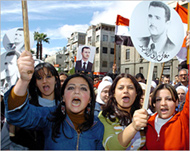UN report slams Arab governments
Undemocratic governments that dominate the Arab world must change their ways swiftly, or face either disastrous internal conflict or reforms imposed by outside powers, a UN report has warned.

The highly critical report by the UN Development Programme (UNDP) warned of a regression of basic human freedoms in Arab countries, charging that repression was stifling the opportunity for an overall Arab renaissance.
Governments often used religion as a cloak for repression, even though there was a wealth of references to individual freedoms and good governance in Arab religious and cultural heritage the Arab Human Development Report 2004 said.
On Tuesday, Oscar Fernandez, of the UNDP’s Arab section, said that despite the different systems of government in the region, they all shared the characteristic of limiting freedoms and fundamental rights.
“The source of these limits is the anti-democratic character of the regimes in power and their appeal to tradition and tribalism,” Fernandez said.
Black hole
The concentration of power in the hands of the state – monarchies, military dictatorships, or unchallenged civilian presidents elected for life – had created a “black hole” where “nothing moves and nothing escapes”, according to the report by a team of mainly Arab scholars and experts.
Although most Arab countries have constitutions proclaiming democratic principles including the separation of powers, freedom of opinion, popular expression and an independent judiciary, authorities largely pay lip service to those pledges, the authors said.
“In the end it’s not a question of values, it’s a question of honesty or dishonesty in their application,” Muhammad Sharfi, a Tunisian academic and member of the report’s supervisory board, said.
“There are too many lies in these statements, or too many declarations that are not applied: therein lies the origin of the evil.”
Institutionalised corruption
The UNDP said corruption had become institutionalised throughout the region in government and business, while clans dominated public life.
|
“There are too many lies in these statements, or too many declarations that are not applied: therein lies the origin |
The report urged Arab governments to address “a chronic crisis of legitimacy”, warning that people were feeling alienated and some would turn to violence or fundamentalism.
“If the repressive situation in Arab countries today continues, intensified societal conflict is likely to follow,” it said.
Arab countries faced three choices, according to the UNDP report.
They could maintain the status quo, but face “impending disaster” with violent upheaval and shifts in power, or gradually accommodate external reform, provided it involved “respect for Arab ownership and leadership”.
However, the ideal was dubbed Izdihar – a “peaceful negotiation on the redistribution of power in Arab countries” that safeguarded freedoms, allowed effective participation and included all religious and political groups.
Signs of change
The UNDP picked up some signs of change including recent local reforms and political declarations at the Arab League summit in Tunis last year.
But it said Arab governments had a habit of organising one-off elections to placate critics, while parliamentary elections in Arab countries had been “little more than empty rituals” and did little for meaningful change.
 |
|
The report says some countries |
While the report pinned most of the blame on the political choices of the authorities in the region, it also slammed the role of foreign powers from colonialism to the present day.
They had applied a double standard by accepting or even encouraging authoritarian rule in the Arab world in exchange for political stability and access to local oil reserves, the world’s largest, it added.
While Western countries were now exerting pressure for democratic change, they had undermined their stance and those of Arab reformers who held them up as a model with measures taken against so-called terror groups in recent years.
Western nations, especially the US, had taken steps that were “widely perceived to be discriminatory and repressive, especially with regard to foreigners”, the report said.